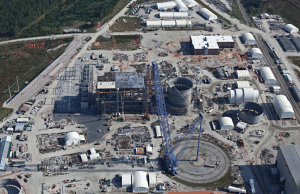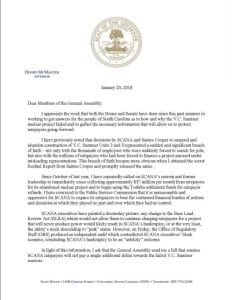SCANA Sale in Doubt as Questions Swirl
Several possible suitors for SCANA Corp. emerged last fall when it became evident the South Carolina utility needed a lifeline, after SCANA subsidiary South Carolina Electric and Gas Co. (SCE&G) and state-owned Santee Cooper pulled the plug on the V.C. Summer nuclear project (Figure 1).
Now the question is whether those who lost out to Virginia-based Dominion Energy—which has had a $14.6 billion agreement in place to buy SCANA since early January—could re-enter the picture, as Dominion has said it might withdraw from the deal. When Dominion on January 3 announced it would buy SCANA, it was thought at least three other Southeast U.S. utility giants were in the running: Duke Energy, Southern Co., and NextEra Energy. Duke is the largest electricity provider in South Carolina.
Duke CEO Lynn Good in a November conference call with company executives and financial analysts said, “we have no interest in the new nuclear plant in South Carolina,” but also said the state is “incredibly important” to the company’s operations.
Southern Co. CEO Tom Fanning, whose company is part of the group building the Vogtle nuclear expansion project in Georgia, has called a purchase of SCANA “a bit of a long putt.”
Florida-based NextEra, meanwhile, reportedly has more than a dozen lobbyists in place at the South Carolina State House in Columbia, keeping an eye on what lawmakers do regarding energy legislation and its impact on SCANA, as well as SCE&G.

The outlook for a SCANA sale has been muddled over the past several days, first by state lawmakers, then by comments from Dominion, next by the results of an audit by South Carolina’s Office of Regulatory Staff (ORS), and then by words from Gov. Henry McMaster, a Republican who on January 23 said SCE&G should pay for the failed Summer project, removing the burden from the utility’s ratepayers.
Lawmakers are looking at the state’s Base Load Review Act, a measure enacted in 2007 that allows SCANA and its partners in the nuclear plant to recover costs of the project from customers. The legislature could repeal the law, putting the project developers on the hook for those costs; in that event, SCANA has said those costs will bankrupt the utility. The audit from ORS, though, put the bankruptcy chance at 35%, prompting McMaster to say lawmakers should repeal the law, and adding he will veto anything other than a full repeal.
In the meantime, Dominion Energy CEO Thomas Farrell on January 16 told a legislative committee he will scuttle the merger if the law is repealed—his company’s deal to buy SCANA was brokered with the belief the utility’s ratepayers would pay for cost recovery. Dominion has said its merger plan would write off $1.7 billion in Summer-related costs, and ratepayers would be charged only for another 20 years, instead of the 50 to 60 years of cost recovery proposed by SCANA. But Farrell said if Dominion can’t recover costs, it will walk away from the deal.
The ORS report was released January 19. SCANA filed an affidavit with the state Public Service Commission, which sets utility rates, on January 22. Iris Griffin, SCANA’s new chief financial officer, wrote that “The accounting conclusions reached in the ORS Report are demonstrably wrong,” and added that the ORS findings “are not entitled to any weight or credibility in this matter.”
The ORS audit looked at SCANA’s revenue, and how much it recovers from ratepayers to pay for the two unfinished reactors at V.C. Summer, a project abandoned in July 2017. The utility collects $445 million annually from customers, or about $37 million a month—the typical customer has about $27 a month added to their electric bill. The report said there was about a 35% chance SCANA would go bankrupt if it lost that revenue.
ORS said SCANA could decide not to write off the $4.7 billion it has invested in the reactors, even if it can’t recover the costs. However, SCANA claims it would have to write down the loss. Griffin in her filing wrote that accounting rules require a write-off if customers can’t be charged. “SCE&G will be required to write off its new nuclear investment. ORS misunderstands this basic accounting requirement,” she wrote. Griffin noted that such a sizable loss would violate the terms of its loans, likely meaning creditors would seek immediate repayment. It would “set in motion a cascading series of events that could be financially detrimental to the Company,” she wrote. Her filing with the PSC said “the ORS opinion is severely flawed due to its fundamental misunderstanding.”
McMaster, meanwhile, on Tuesday sent a letter to lawmakers (Figure 2) asking them to send him a bill that would stop SCANA and SCE&G from continuing to charge ratepayers for the failed nuclear expansion. He criticized the proposed merger with Dominion because it continues to place the burden of cost recovery on the utility’s customers.

“I believe it would be irresponsible for the General Assembly to allow SCANA—or any prospective purchaser—to continue collecting money from ratepayers for this project,” the governor said. “The free market and principles of corporate responsibility demand that the consequences of SCANA’s errors lead where their dividends and profits have landed: with its corporate shareholders and executives.”
McMaster has called on SCANA to cease charging ratepayers for the cost of the Summer project for months, and also said payments the utility received from a settlement with Toshiba regarding the nuclear project should be refunded to ratepayers. Toshiba is the parent company of Westinghouse, which was building the two AP1000 reactors at Summer before declaring bankruptcy in March 2017.
SCANA said it had spent $9 billion in ratepayer funds when it abandoned the V.C. Summer project last July. Final cost estimates for the project, which originally was supposed to cost less than $12 billion, had ballooned to $25 billion. Multiple lawsuits have been filed against the project partners, and the Securities and Exchange Commission is investigating whether SCANA shareholders were misled about the costs of the project.
—Darrell Proctor is a POWER associate editor (@DarrellProctor1, @POWERmagazine)